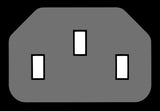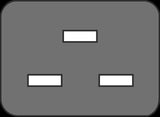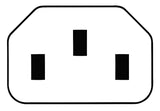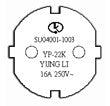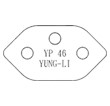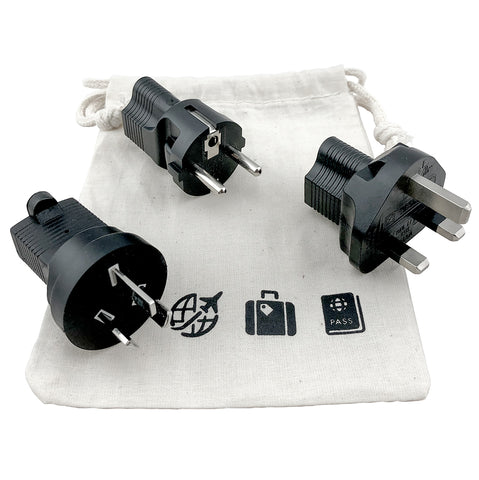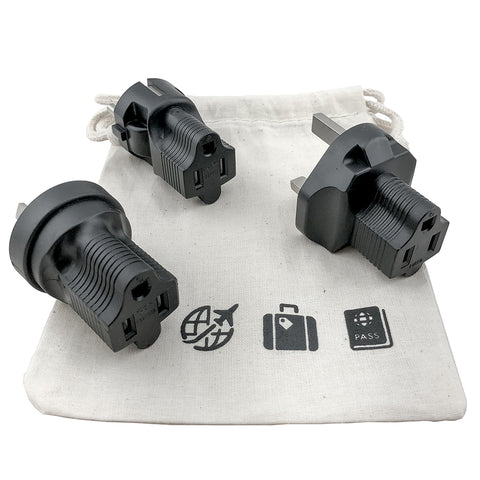Electric Vehicle (EV) Charger Extension Cords
A tethered EV charger extension cable is a type of EV cable that extends the charging range of a tethered charger. Electric vehicle charging extension cables differ significantly from domestic extension cords in terms of their technical specifications. Please note that a domestic extension cord should never be used to charge an electric vehicle. In addition to being unsafe, it is also associated with risks. As well, it can have a negative impact on the warranty of an electric vehicle (EV) or an electric charger.
In order to facilitate the charging of electric vehicles, a portable EV charger is equipped with a number of technical features, including a communication protocol. There is no such requirement for an EV extension cable. As a result, an EV extension cable cannot be used to charge an electric vehicle without a portable or fixed EV charger.
By Country / Region
By Plug Standard
Categories
- NEMA (USA) PLUG CORDS
- IEC / DATA CENTER CORDS
- ELECTRIC VEHICLE
-
POWER CORDS BY COUNTRY
-
ARGENTINA POWER CORDS
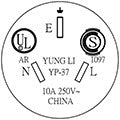
-
AUSTRALIA/NEW ZEALAND POWER CORDS
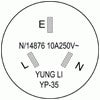
-
BRAZIL POWER CORDS

-
CHINA POWER CORDS

-
DENMARK POWER CORDS

-
EUROPE POWER CORDS
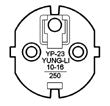
-
GULF COUNTRIES POWER CORDS
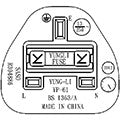
-
HONG KONG POWER CORDS
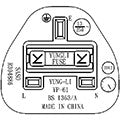
-
INDIA POWER CORDS

-
ISRAEL POWER CORDS

-
ITALY POWER CORDS

-
JAPAN POWER CORDS

-
KOREA POWER CORDS
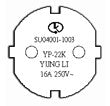
-
MALAYSIA POWER CORDS
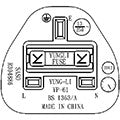
-
RUSSIA POWER CORDS
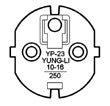
-
SAUDI ARABIA POWER CORDS
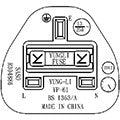
-
SINGAPORE POWER CORDS
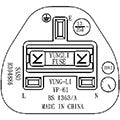
-
SOUTH AFRICA POWER CORDS

-
SWITZERLAND POWER CORDS
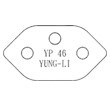
-
TAIWAN POWER CORDS

-
THAILAND POWER CORDS

-
UNITED KINGDOM POWER CORDS
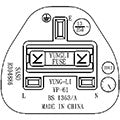
-
ARGENTINA POWER CORDS
- IEC PLUG ADAPTERS
-
PLUG ADAPTERS BY COUNTRY
- USA / CANADA / MEXICO / JAPAN / TAIWAN PLUG ADAPTERS
-
AUSTRALIA/NEW ZEALAND PLUG ADAPTERS
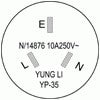
- BRAZIL PLUG ADAPTERS
-
CHINA PLUG ADAPTERS

- DENMARK PLUG ADAPTERS
- EUROPE / RUSSIA PLUG ADAPTERS
-
INDIA PLUG ADAPTERS

- ITALY PLUG ADAPTERS
-
JAPAN PLUG ADAPTERS

- KOREA PLUG ADAPTERS
- SOUTH AFRICA PLUG ADAPTERS
- SWITZERLAND PLUG ADAPTERS
- UK / HK / SAUDI / GULF/
- SINGAPORE / MALAYSIA PLUG ADAPTERS
- CUSTOM POWER CORDS BY COUNTRY
- STOCKED BULK WIRE
- ACCESSORIES
Featured Products
EV Charger for Home
An EV home charger can be installed at your property if you have off-street parking. Through a connector cable, the charger connects to your mains electricity to power your car. It is simply a matter of plugging your car into the charger and waiting for it to be charged. Purchasing an EV charger extension cord can help with charging at home as ports can be installed on the home and then the car parked at a distance away without worrying about the cord reaching.
Charge your electric car (or plug-in hybrid) at home for the most convenient and cheapest way to charge your vehicle.
Based on our calculations, it is much more cost-effective than filling up a traditional petrol or diesel car. When compared to public chargers, it's more convenient and usually cheaper (unless you're able to consistently use free outlets).

EV Charging Stations
A public EV charger can be found at service stations, car parks, supermarkets, cinemas, and even by the side of the road.
Ideally suited for longer trips, public chargers at service stations serve the same purpose as petrol and diesel forecourts. It takes as little as 20-30 minutes for a rapid charging unit to charge up to 80% of the battery.
According to the White House, there are more than 130,000 public charging stations across the country. Electricity is becoming more prevalent in America. From being an outlier in the auto industry to being the wave of the future, electric vehicles are projected to grow by 65% in 2022.
The majority of electric vehicle charging stations across the country are Level 2 stations, which is fine if you have some spare time. Nevertheless, a Level 2 charging station will not enable you to top up your battery and return to driving within a short period of time. Level 2 charging is most commonly used by EV owners while their cars are parked at work or at home overnight.
Best Extension Cord for EV Charging
There are several types of extension cords that can be used with electric cars, but not all of them are equal. Electric cars will benefit from extension cords that are specifically designed for the task since they will be able to handle the high levels of power required to charge them. In selecting an extension cord for electric cars, there are a few factors to consider, such as the length, the gauge, and the amperage rating.
It is currently the most common method of charging an electric vehicle worldwide to use a Mode 3 cable. EV charging stations, such as those found in workplaces, offices, homes, and residential areas, as well as parking lots, require a Mode 3 charging cable.
A standard extension cord should be sufficient for Level 1 charging (120 volts). You will need a heavy-duty extension cord rated for at least 15 amps for Level 2 charging (240 volts). In order to charge at Level 3 (480 volts), you will need an extension cord that can handle high voltages. We recommend consulting a qualified electrician if you have any questions about EV charging or what kind of extension cord you need.
Frequently Asked Question
From empty to full, a typical electric car (60kWh battery) takes just under 8 hours to charge. The majority of drivers prefer to top up their batteries rather than wait for them to fully recharge from an empty to a full charge.
Extension cords should not be used in place of permanent wiring. Make sure you do not run your cable through walls, doorways, ceilings, or floors. Covering cords may result in a fire hazard if heat cannot escape. Extension cords should only be used for one appliance at a time.
Electricity is not consumed by extension cords that are plugged in but not in use. Leaving extension cords plugged in can pose a number of hazards, including fire hazards, shock hazards, and trip hazards. When not in use, it's best to unplug them.







